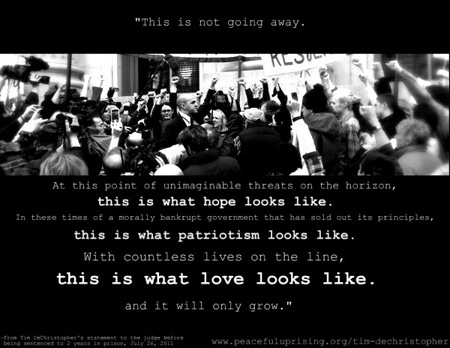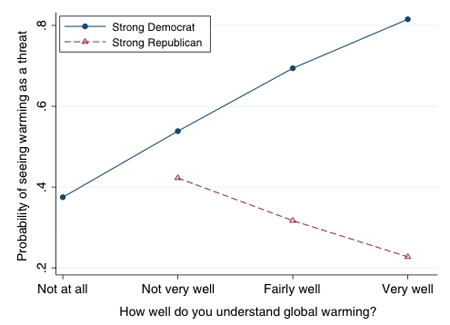
Flickr image by John Wardell (Netinho)
I created this game to help me understand why different people think the way they do about climate change. The game is based on an imaginary scenario with four variables and one choice. By supplying values for the variables and then indicating your choice, you can help me better understand your thinking about climate change.
Step One: The Imaginary Scenario
You are in a casino facing a roulette wheel. On the far side of the wheel stands a croupier. The roulette wheel contains 100 slots. Some of them are red; the rest are black. In a moment you’ll get to choose how many red slots there are. This is Variable 1.
You hold a wad of money. In a moment you’ll get to decide how much money is in the wad. This is Variable 2.
You must bet the entire wad on one spin of the wheel, either on red or black. There are four possible outcomes. From best to worst, they are:
Outcome I: You bet on black, and the ball lands on black. You win. The croupier hands you back your money, and you walk out of the casino.
Outcome II: You bet on red, but the ball lands on black. You lose. The croupier collects your money, but you still get to walk out of the casino.
Outcome III: You bet on red, and the ball lands on red. You win, but you don’t get your money back. Instead, the croupier exchanges your money for a number of blank bullets, which you get to place in the slots of the roulette wheel, one bullet per slot. In a moment we’ll talk about how many blank bullets you get to place. This is Variable 3.
When you have finished placing the blanks into the slots of the roulette wheel, the croupier opens a box of live ammunition and places one bullet in each of the remaining slots. He spins the wheel again, removes either a blank or a real bullet from the slot in which the ball lands, loads the round in a gun, aims at some part of your body, and fires. We’ll talk about where he aims in a minute. This is the final variable, Variable 4.
Assuming you are able to, you walk out of the casino.
Outcome IV: You bet on black, but the ball lands on red. You lose. The croupier collects your money. He then proceeds as he did in Scenario III, except you lose the chance to try to get him to use a blank. Instead, he simply takes the gun, loads a real bullet, aims, and fires. He aims at the same place he would have aimed at in Scenario III.
Assuming you are able to, you walk out of the casino.
That’s the scenario. To play the game, you imagine yourself in that scenario, then say which color you would bet on: red or black.
Step Two: Choosing Values for the Variables
Before you can make your decision, you need to choose values for the four variables so that the imaginary scenario reflects your views about climate change. In order for you to do that, I need to explain what the different parts of the scenario represent.
As you may already be aware, there is a group of people who believe all of the following things:
- The earth is warming.
- Human activities (like fossil fuel use) are the main cause of that warming.
- Bad things will happen if we don’t take action to slow or stop that warming.
- Our actions need to be quick and dramatic, because beyond a certain point amplifying feedbacks may kick in, leading to runaway warming that can’t be stopped no matter what we do.
For easy reference, I’m going to call the people who believe those four things “climate hawks”.
Returning to the imaginary scenario:
You represent human society.
Your bet (red or black) represents whether or not society takes the actions the climate hawks are calling for. A red bet means society takes those actions. A black bet means it does not.
If the roulette wheel lands on black it means that the climate hawks will eventually turn out to be wrong about at least one of the four things they believe.
If the wheel lands on red it means the climate hawks will eventually turn out to be right about all four things.
Since there are 100 slots on the wheel, the number of red slots (Variable 1) can be used to represent the percentage chance that the climate hawks are right about all four things. That is, if you believe there is a 25% chance that the climate hawks are right, you should pick 25 as the value for Variable 1, so there are 25 red slots on the wheel and 75 black slots. If you believe there is a 75% chance they are right, you should pick 75, so there are 75 red slots on the wheel and 25 black slots. I’m not trying to push you in any particular direction. I just want to know what you think. If you are sure that the climate hawks are wrong (or right), you’re free to choose 0 (or 100) for the number of red slots. It’s up to you.
The amount of money in the wad (Variable 2) represents the cost to society of investing in the sorts of actions the climate hawks are calling for, as opposed to investing in whatever else society might choose to invest in. Somewhat arbitrarily, I’ve picked $100,000 (roughly twice the average annual household income in the US) as the maximum number for the imaginary scenario. So, pick a number between 0 and $100,000 for this variable. The idea here is that you are choosing a number that “feels” right to you, in the sense that the pain that an individual head of household would feel if he or she lost that money in a single spin at the roulette wheel would be roughly comparable to the pain that society would feel if we invested in action on climate change, only to find out that that action was not necessary.
The number of blank bullets that you get to place on the wheel if you bet on red, and the ball lands on red (Variable 3), represents the percentage reduction in the chance of catastrophe if the hawks are right, and we do take their recommended actions. That is, it’s your best guess as to the chance that the hawks’ recommended actions will actually work to prevent catastrophe, should the hawks turn out to be right in their four beliefs. If you think the hawks’ recommended actions have a 25% chance of averting catastrophe in that scenario, you should choose 25 for this variable. If you think those actions have a 75% chance of averting catastrophe, you should choose 75. And so on.
The point at which the croupier aims his gun (Variable 4) should reflect your best guess as to the actual negative consequences society will suffer if the climate hawks are correct in their four beliefs, and we don’t succeed in averting those consequences. For this variable I’ve somewhat arbitrarily picked the following aiming points, reflecting different degrees of likely harm:
- The croupier aims just to one side of your head, so that the bullet whistles past your ear. You are scared, but not injured. In the real world, this might mean you believe that even if the climate hawks are right about the four beliefs listed above, some other factor will make it so that the actual consequences we suffer from climate change will turn out to be negligible.
- He aims at your foot. You are injured, and may suffer some longterm negative consequences, but probably not very extensive ones. In the real world, there might be some sort of ongoing negative effects, but not very extensive ones: Some moderate economic impacts, some sea level rise, and so on, but nothing too dramatic.
- He aims at your thigh. You are injured, perhaps seriously so, but with a decent chance of at least partial recovery. In the real world, this might be some dramatic negative consequences — drought, flooding, famine, displaced populations — but there would be a decent chance that it would only span a relatively limited area, and/or for a relatively limited period of time.
- He aims at your torso. You are badly injured, with significant risk of longterm consequences or death, but with some possibility of eventual recovery of at least some degree. In the real world, this might be dramatic, catastrophic consequences over an extensive area and/or an extensive span of time, though with some possibility of eventual recovery.
- He aims at your head. You are severely injured, and probably killed. In real-world terms, this would be a major climate catastrophe, characterized by famine, war, and probably a general societal collapse, with severe negative consequences continuing over most of the world for a span of centuries or longer.
Step Three: Place Your Bet!
Whew. We’re ready to play the game. Take the values you picked for the four variables, plug them into the scenario, and then imagine yourself facing that scenario.
Now answer this question: Which would you bet on, red or black?
Please put the values you chose for the variables, and the bet you chose to make, in the comments. Thanks!



